 Tufo, therefore, has strong religions roots. The same archival documents reveal that, in its origin, the dance was only performed in rituals and festive moments associated to the Muslim faith, but with time the dance was popularized and secularized.
Tufo, therefore, has strong religions roots. The same archival documents reveal that, in its origin, the dance was only performed in rituals and festive moments associated to the Muslim faith, but with time the dance was popularized and secularized.
Stages
29.01.2020 | by Hélio Nguane
 “When I was little, I was mesmerized listening to the stories told by my grandparents. My grandfather was a sailor. He travelled to the poles for exploration and when he returned he would tell us a lot of stories. It is a very special thing for me to tell my family's stories. What about my grandmother! My grandmother had an incredible imagination. She made up stories. My favorite story was 'Kai Hai'. It was the name of a shark, Kai.
“When I was little, I was mesmerized listening to the stories told by my grandparents. My grandfather was a sailor. He travelled to the poles for exploration and when he returned he would tell us a lot of stories. It is a very special thing for me to tell my family's stories. What about my grandmother! My grandmother had an incredible imagination. She made up stories. My favorite story was 'Kai Hai'. It was the name of a shark, Kai.
Face to face
29.01.2020 | by Sinem Taş
 We can establish, through renewed rituals, a collective ethic of memory. This shows that the fractured past has to be used with a sense of responsibility that is public, and not private, that is of the present, and not of the past. This responsibility concerns not only Northern Ireland, but all the unheralded contexts of divided memory. Ours too.
We can establish, through renewed rituals, a collective ethic of memory. This shows that the fractured past has to be used with a sense of responsibility that is public, and not private, that is of the present, and not of the past. This responsibility concerns not only Northern Ireland, but all the unheralded contexts of divided memory. Ours too.
To read
28.01.2020 | by Roberto Vecchi
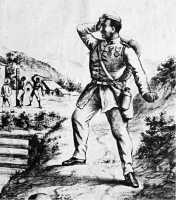 It would be a supreme fantasy to think, naively, that we can fully recognize the black blood that lies beneath the foundations of nation-empires and post-empires if we also leave in place the very stones that sustain and adorn the idea of the nation.
It would be a supreme fantasy to think, naively, that we can fully recognize the black blood that lies beneath the foundations of nation-empires and post-empires if we also leave in place the very stones that sustain and adorn the idea of the nation.
To read
28.01.2020 | by Bruno Sena Martins
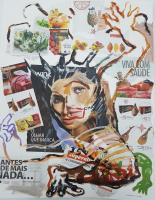 We urgently need a return to culture as the filter between individuals and the political, broadly conceived. Without this we will not escape from the current situation that, not only in Italy, finds its reflection in the protagonist of Paolo Sorrentino’s acclaimed La Grande Bellezza: the tragic, failed, mundane visage of Jep Gambardella.
We urgently need a return to culture as the filter between individuals and the political, broadly conceived. Without this we will not escape from the current situation that, not only in Italy, finds its reflection in the protagonist of Paolo Sorrentino’s acclaimed La Grande Bellezza: the tragic, failed, mundane visage of Jep Gambardella.
To read
28.01.2020 | by Lívia Apa
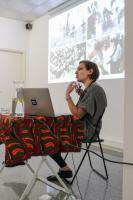 My research on the nonaligned comes from a cultural and art-historical position. It is an interdisciplinary approach to understanding how the non-aligned movement, apart from creating political, or social, or economic alliances was also attempting to create cultural alliances that would counter Western cultural hegemony, and what many in the movement, who were interested in culture, also called Western cultural imperialism.
My research on the nonaligned comes from a cultural and art-historical position. It is an interdisciplinary approach to understanding how the non-aligned movement, apart from creating political, or social, or economic alliances was also attempting to create cultural alliances that would counter Western cultural hegemony, and what many in the movement, who were interested in culture, also called Western cultural imperialism.
Face to face
03.01.2020 | by Iolanda Vasile
 In France, in spite of the economic context of the Trente Glorieuses being favourable to the absorption of labour, the socioprofessional characteristics of the French people who arrived from Algeria did not correspond to the needs of the French labour market, which required industrially qualified workers. In the Portuguese case the inverse situation pertained.
In France, in spite of the economic context of the Trente Glorieuses being favourable to the absorption of labour, the socioprofessional characteristics of the French people who arrived from Algeria did not correspond to the needs of the French labour market, which required industrially qualified workers. In the Portuguese case the inverse situation pertained.
To read
02.01.2020 | by Morgane Delaunay
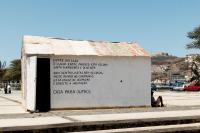 What is at stake in Djaimilia Pereira de Almeida’s book are the living, human ruins of empire. No longer based on the figure of the veteran or the returnee, but on someone from the other side of the line colonialism traced: a black man and, in this case, the complex figure that colonialism generated, the assimilated African who, here, for the first time in Portuguese literature, is at the centre of the narrative.
What is at stake in Djaimilia Pereira de Almeida’s book are the living, human ruins of empire. No longer based on the figure of the veteran or the returnee, but on someone from the other side of the line colonialism traced: a black man and, in this case, the complex figure that colonialism generated, the assimilated African who, here, for the first time in Portuguese literature, is at the centre of the narrative.
To read
26.12.2019 | by Margarida Calafate Ribeiro
 Gabriel was born in 1988, in Colombia, and was adopted by a Norwegian family in 1989. Growing up in a small, pretty little town in east Norway, he was the only brunette among the blonde kids. "You can spot this darker kid in the middle of blue-eyed, blond kids in our class photo for kindergarten. I was aware of how different I was when I was a kid.
Gabriel was born in 1988, in Colombia, and was adopted by a Norwegian family in 1989. Growing up in a small, pretty little town in east Norway, he was the only brunette among the blonde kids. "You can spot this darker kid in the middle of blue-eyed, blond kids in our class photo for kindergarten. I was aware of how different I was when I was a kid.
Face to face
23.12.2019 | by Sinem Taş
 There is something poetic in a city cut through by a river, like the imperturbable flow of the Mondego between the banks from which Coimbra sprawls. The river is the image of continuity and impermanence, its time a tangent to infinity. Our existences, as fleeting as the people who cross it, the bridges that cut across it and the waters that pass through it, are the height of discontinuity; our time is minuscule compared to the river.
There is something poetic in a city cut through by a river, like the imperturbable flow of the Mondego between the banks from which Coimbra sprawls. The river is the image of continuity and impermanence, its time a tangent to infinity. Our existences, as fleeting as the people who cross it, the bridges that cut across it and the waters that pass through it, are the height of discontinuity; our time is minuscule compared to the river.
Mukanda
19.12.2019 | by Lígia Afonso, Agnaldo Farias and Nuno de Brito Rocha
 They create a network of different approaches to the rural and simultaneously call attention to ecological concerns. The works constitute potent signifiers within a global discourse of regionalism as well as representing a call to (poetic) action within our natural environment.
They create a network of different approaches to the rural and simultaneously call attention to ecological concerns. The works constitute potent signifiers within a global discourse of regionalism as well as representing a call to (poetic) action within our natural environment.
Mukanda
04.12.2019 | by vários
 Jimmie Durham brings to the surface the issue of the truth of the artwork, probably one of the most relevant themes in a world that is constantly forgetting about the fictional nature of art – not necessarily implying that it lacks an intrinsic paradoxical truth in its materiality and representational nature.
Jimmie Durham brings to the surface the issue of the truth of the artwork, probably one of the most relevant themes in a world that is constantly forgetting about the fictional nature of art – not necessarily implying that it lacks an intrinsic paradoxical truth in its materiality and representational nature.
I'll visit
04.12.2019 | by Delfim Sardo
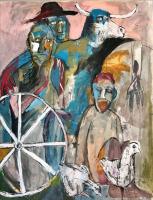 The construction of postmemory is a complex process which may take place in very different ways and, as is worth repeating, is never simply based on transmission, but, rather, implies an active positioning, a decision, on the part of members of a second generation. Such a decision is never simply played out at a strictly rational level, it inevitably presupposes a high degree of emotional involvement.
The construction of postmemory is a complex process which may take place in very different ways and, as is worth repeating, is never simply based on transmission, but, rather, implies an active positioning, a decision, on the part of members of a second generation. Such a decision is never simply played out at a strictly rational level, it inevitably presupposes a high degree of emotional involvement.
To read
30.11.2019 | by António Sousa Ribeiro
 What if we accounted for all labor that was put in the development of those lands, both human, and non-human, the living, the inert, and the not-yet-lived, would this then lead us to a new understanding of its environment and its constitution as a disappearing geological strata in flux? Can we interpret how the energetic metabolism speculated around the Mississippi is withholding processes of land recuperation and human health, while privileging forms of dissolved property?
What if we accounted for all labor that was put in the development of those lands, both human, and non-human, the living, the inert, and the not-yet-lived, would this then lead us to a new understanding of its environment and its constitution as a disappearing geological strata in flux? Can we interpret how the energetic metabolism speculated around the Mississippi is withholding processes of land recuperation and human health, while privileging forms of dissolved property?
Games Without Borders
27.11.2019 | by Margarida Mendes
 Keating accumulates the disregarded and overlooked traces of the Irish presence in Jamaica, inserting previously muted voices into the archive. In doing so, she critiques the dominant Western constructions of nationhood and identity, producing an alternative to the master narratives that shape one’ worldviews in the West.
Keating accumulates the disregarded and overlooked traces of the Irish presence in Jamaica, inserting previously muted voices into the archive. In doing so, she critiques the dominant Western constructions of nationhood and identity, producing an alternative to the master narratives that shape one’ worldviews in the West.
Mukanda
19.11.2019 | by Miguel Amado
 Historian Marissa Moorman wrote an important book about radio and modern state power. "Only radio receivers can feel radio waves. But people feel radio. Radio, Moorman reminds us, courses through our lives everywhere we go and alongside everything we do."
Historian Marissa Moorman wrote an important book about radio and modern state power. "Only radio receivers can feel radio waves. But people feel radio. Radio, Moorman reminds us, courses through our lives everywhere we go and alongside everything we do."
To read
15.11.2019 | by Jesse Bucher
 "Mom had this incredible energy. You know science says 'energy cannot be created not destroyed'. The fact that her body has left us doesn't mean she isn't with us. She is everywhere. That's why I got this tattoo: It says 'Death cannot kill'. Though she has left this place, she still continues to teach me a lot".
"Mom had this incredible energy. You know science says 'energy cannot be created not destroyed'. The fact that her body has left us doesn't mean she isn't with us. She is everywhere. That's why I got this tattoo: It says 'Death cannot kill'. Though she has left this place, she still continues to teach me a lot".
Face to face
14.11.2019 | by Sinem Taş
 ‘The Missing Face’ is a powerful reflection on the war, and above all on the ownership of traumatic experiences of conflict, specifically at the end of Portuguese colonialism in Africa.
‘The Missing Face’ is a powerful reflection on the war, and above all on the ownership of traumatic experiences of conflict, specifically at the end of Portuguese colonialism in Africa.
To read
12.11.2019 | by Felipe Cammaert
 Museums are democratising, inclusive and polyphonic spaces for critical dialogue about the pasts and the futures. Acknowledging and addressing the conflicts and challenges of the present, they hold artefacts and specimens in trust for society, safeguard diverse memories for future generations and guarantee equal rights and equal access to heritage for all people.
Museums are democratising, inclusive and polyphonic spaces for critical dialogue about the pasts and the futures. Acknowledging and addressing the conflicts and challenges of the present, they hold artefacts and specimens in trust for society, safeguard diverse memories for future generations and guarantee equal rights and equal access to heritage for all people.
To read
07.11.2019 | by António Pinto Ribeiro
 One of the other ways in which you see coloniality reemerge, is precisely in the mission the museum ascribes itself. "Africa" is an object of study while the idea of representativeness and the desire to be a window on a continent are the basic epistemological principles of imperialist logic. The scenography continues the "chosification" and "domestication"
One of the other ways in which you see coloniality reemerge, is precisely in the mission the museum ascribes itself. "Africa" is an object of study while the idea of representativeness and the desire to be a window on a continent are the basic epistemological principles of imperialist logic. The scenography continues the "chosification" and "domestication"
Afroscreen
23.10.2019 | by Marta Lança